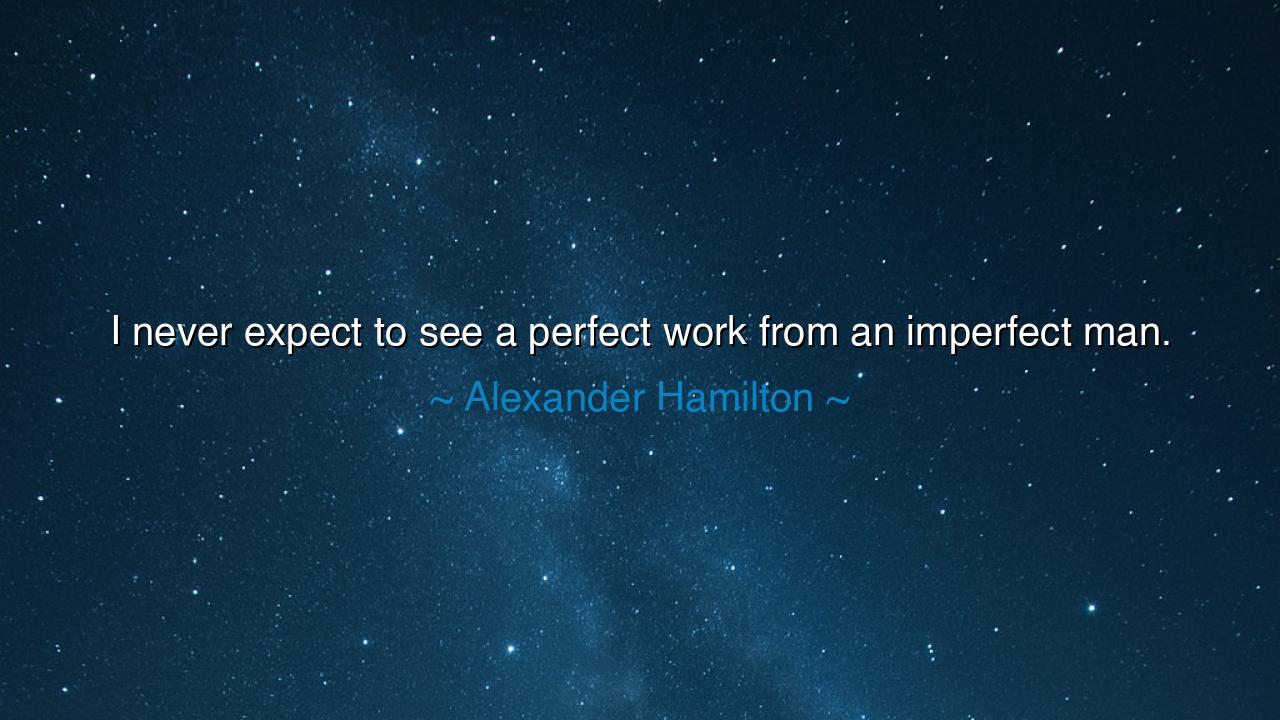
I never expect to see a perfect work from an imperfect man.






The words of Alexander Hamilton—“I never expect to see a perfect work from an imperfect man”—resound with the sober wisdom of one who knew both the brilliance and the frailty of human endeavor. They remind us that all things born of human hands bear the marks of limitation, that perfection belongs to the realm of ideals, while flesh and blood can only strive toward it.
The ancients knew this truth well. They spoke of man as a mixture of light and shadow, capable of greatness yet bound by weakness. Even the most celebrated temples, laws, and philosophies were acknowledged as fragments of a higher truth, reflections of perfection glimpsed but never fully grasped. Hamilton echoes this lineage of thought: to demand flawless work from mortals is folly, but to value earnest striving is wisdom.
This truth is also humbling. For pride tempts us to believe we may fashion something eternal and unblemished, yet time reveals the cracks in every monument, the flaws in every system, the errors in every design. And yet, those same imperfect works move the world forward, step by step, carrying humanity closer to justice, beauty, and knowledge than it stood before.
Hamilton’s words are heroic in their realism. They do not diminish the labor of men, but honor it. To recognize imperfection is not to despair, but to embrace persistence, to see progress as more valuable than impossible perfection. The ancients would have called this endurance—the noble acceptance that the journey matters more than the flawless arrival.
So let this teaching endure: expect not perfection from mankind, but honor the courage to attempt, to build, to create despite our flaws. For though every work may be incomplete, it is through these imperfect labors that civilization rises, that truth is approached, and that the human spirit proves its resilience. The divine may embody perfection, but man’s greatness lies in his striving.






NDNgo Dat
Hamilton’s idea is both comforting and challenging. On one hand, it reminds us to be kinder to ourselves when our work falls short of perfection. On the other, it raises the question: how do we maintain high standards in our work when we know that perfection isn’t possible? Can we ever truly be satisfied with imperfection, or does it always drive us to want more?
UGUser Google
I find Alexander Hamilton’s quote to be quite grounding. It puts things into perspective—since we’re all imperfect, why expect flawless results? But I also wonder: does this mean we should accept mediocrity? At what point does accepting imperfections hinder growth or the quality of work? How do we push ourselves to improve without falling into the trap of chasing unattainable perfection?
MA9/8 01- Dao Minh Anh
Hamilton’s quote is quite liberating. It suggests that we can’t expect perfection from ourselves or others. But does this mean we shouldn’t even try to improve? How do we stay motivated to produce high-quality work if we know it can never be perfect? Is the pursuit of excellence still worth it, or is it more about accepting where we are and continually evolving?
UGUser Google
This quote by Hamilton is a reminder that perfection isn’t the goal—growth and improvement are. It got me thinking about how we often feel defeated when our efforts don’t result in perfect outcomes. Should we focus on the process more than the result? What would happen if we allowed ourselves to embrace imperfection in our work and saw it as an opportunity to learn instead of a failure?
TTThuy Trang
Hamilton’s words remind me that no one is truly perfect, and the work we do reflects our imperfections. But can we still aim for greatness even if perfection is impossible? It also makes me question, should we focus more on progress than perfection? How much room should we give ourselves to make mistakes and learn along the way without letting that hinder our work?